- Home
- Robert Graves
Goodbye to All That Page 21
Goodbye to All That Read online
Page 21
One evening (near ‘Trafalgar Square’, should any reader remember that trench-junction), Richardson, David Thomas, and I met Pritchard and the adjutant. We stopped to talk. Richardson complained what a devil of a place this was for trench-mortars.
‘That’s where I come in,’ said Pritchard. As battalion trench-mortar officer he had just been given two Stokes mortar-guns. ‘They’re beauties,’ Pritchard went on. ‘I’ve been trying them out, and tomorrow I’m going to get some of my own back. I can put four or five shells in the air at once.’
‘About time, too,’ the adjutant said. ‘We’ve had three hundred casualties in the last month here. It doesn’t seem so many as that because, curiously enough, none of them have been officers. In fact, we’ve had about five hundred casualties in the ranks since Loos, and not a single officer.’
Then he suddenly realized that his words were unlucky.
‘Touch wood!’ David shouted.
Everybody jumped to touch wood, but it was a French trench and unrevetted. I pulled a pencil out of my pocket; that was wood enough for me.
Richardson said: ‘I’m not superstitious, anyway.’
The following evening I led ‘A’ Company forward as a working-party. ‘B’ and ‘D’ Companies were in the line, and we overtook ‘C’ also going to work. David, bringing up the rear of ‘C’, looked worried about something. ‘What’s wrong?’ I asked.
‘Oh, I’m fed up,’ he answered, ‘and I’ve got a cold.’
‘C’ Company filed along to the right of the battalion frontage; and we went to the left. It was a weird kind of night, with a bright moon. Germans occupied a sap only forty or fifty yards away. We stood on the parapet piling the sandbags, with the moon at our backs, but the German sentries ignored us – probably because they had work on hand themselves. It happened at times, when both sides were busy putting up proper defences, that they turned a blind eye to each other’s work. Occasionally, it was said, the rival wiring-parties ‘as good as used the same mallets’ for hammering in the pickets. The Germans seemed much more ready than we were to live and let live. (Only once, so far as I know, apart from Christmas 1914, did both sides show themselves in daylight without firing at each other: one February at Ypres, when the trenches got so flooded that everyone had to crawl out on top to avoid drowning.) Nevertheless, a continuous exchange of grenades and trench-mortars had begun. Several canisters went over, and the men found it difficult to get out of their way in the dark; but for the first time we were giving the enemy as good as they gave us. Pritchard had been using his Stokes mortars all day, and sent over hundreds of rounds; twice the Germans had located his emplacement and forced him to shift hurriedly.
‘A’ Company worked from seven in the evening until midnight. We must have put three thousand sandbags into position, and fifty yards of front trench were already looking presentable. About half past ten, rifle fire broke out on the right, and the sentries passed along the news: ‘Officer hit.’
Richardson hurried away to investigate. He came back to say: ‘It’s young Thomas. A bullet through the neck; but I think he’s all right. It can’t have hit his spine or an artery, because he’s walking to the dressing-station.’
I was delighted: David should now be away long enough to escape the coming offensive, and perhaps even the rest of the war.
At twelve o’clock we finished for the night. Richardson said: ‘Von Ranke,’ (only he pronounced it ‘von Runicke’ – which was my regimental nickname) ‘take the company down for their rum and tea, will you? They’ve certainly earned it tonight. I’ll be back in a few minutes. I’m going out with Corporal Chamberlen to see what the wiring-party’s been at’ As I took the men back, I heard a couple of shells fall somewhere behind us. I noticed them, because they were the only shells fired that night: five-nines by the noise. We had hardly reached the support line on the reverse side of the hill, when we heard the cry: ‘Stretcher-bearers!’ and presently a man ran up to say: ‘Captain Graves is hit!’
That raised a general laugh, and we walked on; but all the same I sent a stretcher-party to investigate. It was Richardson: the shells had caught him and Corporal Chamberlen among the wire. Chamberlen lost his leg and died of wounds a day or two later. Richardson, blown into a shell-hole full of water, lay there stunned for some minutes before the sentries heard the corporal’s cries and realized what had happened. The stretcher-bearers brought him down semi-conscious; he recognized us, said he wouldn’t be long away from the company, and gave me instructions about it. The doctor found no wound in any vital spot, though the skin of his left side had been riddled, as we saw, with the chalky soil blown against it We felt the same relief in his case as in David’s: that he would be out of it for a while.
Then news came that David was dead. The regimental doctor, a throat specialist in civil life, had told him at the dressing-station: ‘You’ll be all right only don’t raise your head for a bit.’ David then took a letter from his pocket, gave it to an orderly, and said: ‘Post this!’ It had been written to a girl in Glamorgan, for delivery if he got killed. The doctor saw that he was choking and tried tracheotomy; but too late.
Edmund and I were talking together in ‘A’ Company headquarters at about one o’clock when the adjutant entered. He looked ghastly. Richardson was dead: the explosion and the cold water had overstrained his heart weakened by rowing in the Eight at Radley. The adjutant said nervously: ‘You know, somehow I feel – responsible in a way for this; what I said yesterday at Trafalgar Square. Of course, really, I don’t believe in superstition, but…’
Just at that moment three or four whizz-bang shells burst about twenty yards off. A cry of alarm went up, followed by: ‘Stretcher-bearers!’
The adjutant turned white, and we did not have to be told what had happened. Pritchard, having fought his duel all night and finally silenced the enemy, was coming off duty. A whizz-bang had caught him at the point where the communication trench reached Maple Redoubt – a direct hit. The total casualties were three officers and one corporal.
It seemed ridiculous, when we returned without Richardson to ‘A’ Company billets in Morlancourt to find the old lady still alive, and to hear her once more quaver: ‘Triste, la guerre!’, when her daughter explained that le jeune capitaine had been killed. The old woman had taken a fancy to le jeune capitaine; we used to chaff him about it.
I felt David’s death worse than any other since I had been in France, but it did not anger me as it did Siegfried. He was acting transport-officer and every evening now, when he came up with the rations, went out on patrol looking for Germans to kill. I just felt empty and lost.
One of the anthems that we used to sing in the mess was: ‘He that shall endure to the end, shall be saved.’ The words repeated themselves in my head, like a charm, whenever things went wrong. ‘Though thousands languish and fall beside thee, And tens of thousands around thee perish, Yet still it shall not come nigh thee.’ And there was another bit: ‘To an inheritance incorruptible… Through faith unto salvation, Ready to be revealed at the last trump.’ For ‘trump’ we always used to sing ‘crump’. A crump was a German five-point-nine shell, and ‘the last crump’ would be the end of the war. Should we ever live to hear it burst safely behind us? I wondered whether I could endure to the end with faith unto salvation… My breaking-point was near now, unless something happened to stave it off. Not that I felt frightened. I had never yet lost my head and turned tail through fright, and knew that I never would. Nor would the breakdown come as insanity; I did not have it in me. It would be a general nervous collapse, with tears and twitchings and dirtied trousers; I had seen cases like that.
We were issued with a new gas-helmet popularly known as ‘the goggle-eyed booger with the tit’. It differed from the previous models. One breathed in through the nose from inside the helmet, and breathed out through a special valve held in the mouth; but I could not manage this. Boxing with an already broken nose had recently displaced the septum, which forced me to breathe throu
gh my mouth. In a gas-attack, I would be unable to use the helmet – the only type claimed to be proof against the newest German gas. The battalion doctor advised a nose-operation as soon as possible.
I took his advice, and missed being with the First Battalion when the expected offensive started. Three out of five of my fellow-officers were killed in it Scatter’s dream of open warfare failed to materialize. He himself got very badly wounded. Of ‘A’ Company choir, there is one survivor besides myself: C. D. Morgan, who had his thigh smashed, and was still in hospital some months after the war ended.
19
I WENT on leave in April 1916. That Good Friday was the last occasion on which I ever attended a church service, apart from subsequent weddings, church parades, and so on. I remember the date, because the choir boys wore no surplices, and the psalms were read, not sung. My father wanted me to attend the early morning service, and even tried to bully me into it, but I was owed thirteen months’ sleep; and though he came hobbling along to my bedroom door at half past six, banging loudly and saying that my mother counted on my accompanying her, this day of all days, I did not turn out. I pleaded a bad toothache; and it wasn’t an excuse. A rear molar had flared up. So they had a grievance at breakfast and, having won the first trick, I knew that I must lost the second and attend the morning service. Not wanting to face a religious argument, I decided to humour my parents; if they believed that God stood squarely behind the British Expeditionary Force, it would be unkind to dissent.
I smelt no rat beyond a slight suspicion that they were anxious to show me off in church wearing my battle-stained officer’s uniform. But my toothache got the better of me and arguments arose at the breakfast-table, during which I said things that angered my father and grieved my mother. At last, on her account alone – because she took no active part in the argument just looking sad and only officially siding with my father – I consented to come with them.
At nine o’clock they went upstairs to dress. The service was to be at half past nine. I thought this unusually early for matins, but attributed it to the new wartime principle of getting things over quickly. Then a ring came at the door. The proprietor of a neighbouring bath-chair business had arrived with a bath-chair. He explained that, as he had previously told my mother, they could not spare a man to take it to church, being seriously under-staffed because of the war – his sole remaining employee, in fact, had a job pulling the aged Countess of I-forget-what to the parish church, a mile or so in the opposite direction. For the moment I thought that it had been a very generous thought of my mother’s on my behalf but, ill as I felt, I could surely manage to reach the church, about half a mile away, without such a parade of infirmity. I forgot my father’s gout, and also forgot that passage in Herodotus about the two dutiful sons who yoked themselves to an ox-cart to pull their mother, the priestess, to the Temple and were oddly used by Solon, in a conversation with King Croesus, as a symbol of ultimate happiness.
When I realized what I was in for, I could only laugh. Then down came my mother with her prayer-book, veil, and deep religious look, and I could not spoil the day for her. I took hold of the beastly vehicle without a word; my father appeared in a top-hat and his better carpet-slippers and hoisted himself in; and we set off The bath-chair needed oiling badly; also, one tyre kept coming unstuck and winding itself around the axle. There was an appreciable slope down towards the church, and so the going, though heavy, was easier than the returning. By half past ten the service did not seem to be getting on so fast as it should have, and I grew dreadfully bored, longing to sneak outside for – well, anyhow, I wanted to sneak outside.
I whispered to my mother: ‘Isn’t it nearly over?’
She answered: ‘My dear, didn’t your father tell you that it would be a three-hour service? And, of course, since you couldn’t get up to pull him to church for the early service, he’ll want to stay for Holy Communion at the end. That will make it a little longer.’
So I stayed and tried to compose Latin epigrams, which was, in those days, my way of killing time – on ceremonial parades, for instance, or in the dentist’s chair, or at night in the trenches when things were quiet. I composed a maledictory epigram on the strapping young curate – besides myself, my father, the verger, and an old, old man with a palsied hand sitting just in front of me, the only male in the congregation, though there were sixty or seventy women present I tried to remember whether the i of clericus was long or short, and couldn’t; but it did not matter, because I could make alternative versions to suit either case:
O si bracchipotens qui fulminat ore clericus…
and:
O si bracchipotens clericus qui fulminat ore…*
For he was now preaching a sermon about Divine Sacrifice, and bellowing about the Glurious Performances of our Sums and Brethren in Frurnce today. I decided to ask him afterwards why, if he felt like that, he wasn’t himself either in Frurnce or in khurki.
To please my mother I took the Sacrament, though by no means in the required mood of spiritual resignation. That ends the story, except the being introduced at the church door to new family friends – ‘Your father has showed us your very interesting letters from the trenches. Do tell me, etc., etc.’ – and the dreary push up-hill, my mother helping me, my father holding her prayer-book, myself sweating like a bull.
The next day I went first to a dentist, and then to the Milbank Military Hospital in London, where I had my nose operated on free by an Army surgeon. In peacetime this would have cost me sixty guineas, and another twenty guineas in nursing-home fees. On the other hand, I should have been able to pick my specialist; this one bungled the job, and I still cannot breathe properly through one nostril.
After a stay in hospital, I went up to Harlech and walked the hills. The verse of a psalm: ‘I will lift up mine eyes unto the hills, from whence cometh my help’, had been another charm against trouble; though I have since learned that the last five words of the original Hebrew are really a question, not a relative clause. I bought a small two-roomed cottage from my mother, who owned considerable house-property at Harlech. This was done in defiance of the war: something to look forward to when the guns stopped. We always thought of the end of the war as ‘when the guns stop’. I white-washed the cottage, which stood at some distance from the village, and furnished it with a table, a chair, a bed, a few dishes, and cooking utensils. I had decided to live there one day on bread and butter, bacon and eggs, lettuce in season, cabbage and coffee; and to write poetry. My war-bonus would keep me for a year or two at least Having put in a big window to look out over the wood below and across the broad plain to the sea, I wrote two or three poems here as a foretaste of the good life to come; but have suppressed them all since.
Later, in London, my father took me to a dinner of the Honourable Cymmrodorion Society – a Welsh literary club – where Lloyd George, then Secretary for War, and W. M. Hughes, the Australian Prime Minister, both spoke. Hughes was perky, dry, and to the point; Lloyd George was up in the air on one of his ‘glory of the Welsh hills’ speeches. The power of his rhetoric amazed me. The substance of the speech might be commonplace, idle, and false, but I had to fight hard against abandoning myself with the rest of his authence. He sucked power from his listeners and spurted it back at them. Afterwards, my father introduced me to Lloyd George, and when I looked closely at his eyes they seemed like those of a sleep-walker.
I rejoined the Third Battalion at Litherland, near Liverpool, where it had been shifted from Wrexham as part of the Mersey defence force. The senior officers generously put no more work on me than I wished to undertake, and I met again three of my Wrexham contemporaries who had been severely wounded (all of them, by a coincidence, in the left thigh), and seemed to be out of it for the rest of the war – Frank Jones-Bateman and ‘Father’ Watkin, who had been in the Welsh Regiment with me, and Aubrey Attwater, the assistant adjutant, who had gone to the Second Battalion early in 1915, and been badly hit when out on patrol. Attwater came from Cambridge at
the outbreak of the war and was known as ‘Brains’ in the battalion. The militia majors, for the most part country gentlemen with estates in Wales and no thoughts in peacetime beyond hunting, shooting, fishing, and the control of their tenantry, were delighted with Attwater’s informative talk over the port at mess. Sergeant Malley, the mess-sergeant, would go round with his ‘Light or vintage, sir?’, and the old majors would prompt Attwater: ‘Now, Brains! Tell us about Shakespeare. Is it true that Bacon wrote him?’ Or: ‘Well, Brains! What do you think about this chap Hilaire Belloc? Does he really know when the war’s going to end?’ Attwater would humorously accept his position as combined encyclopedia and almanac Sergeant Malley, another friend whom I was always pleased to see again, could pour more wine into a glass than any other waiter in the world: it bulged up over the top like a cap, and he never spilled a drop.
Wednesdays were guest-nights in the mess, when the colonel expected the married officers, who usually dined at home, to attend. The band played Gilbert and Sullivan music behind a curtain. In the intervals, the regimental harper gave solos – Welsh melodies picked out rather uncertainly on a hand-harp. Afterwards the bandmaster was invited to the senior officers’ table for his complimentary glass of Light or Vintage. When he and the junior officers had retired, the port went round and round, and the conversation, at first very formal, became rambling and intimate. Once, I remember, an old major laid it down axiomatically that every so-called sportsman had at some time or other committed a sin against sportsmanship. When challenged to make good this slander, he cross-examined each of his neighbours in turn, putting them on their honour to tell the truth.

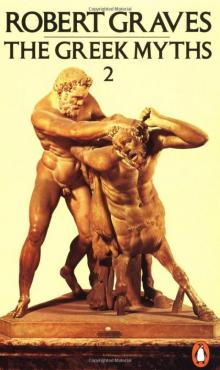 The Greek Myths, Volume2
The Greek Myths, Volume2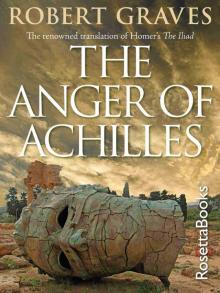 The Anger of Achilles: Homer's Iliad
The Anger of Achilles: Homer's Iliad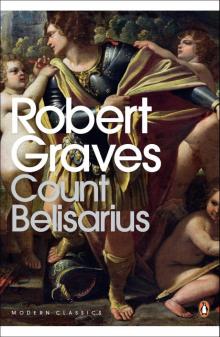 Count Belisarius
Count Belisarius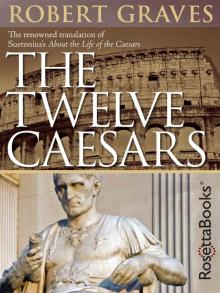 The Twelve Caesars
The Twelve Caesars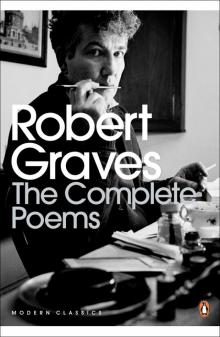 Complete Poems 3 (Robert Graves Programme)
Complete Poems 3 (Robert Graves Programme) Homer's Daughter
Homer's Daughter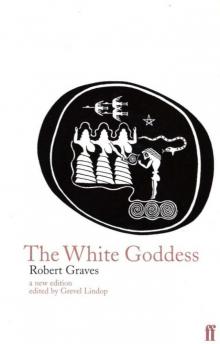 The White Goddess
The White Goddess Goodbye to All That
Goodbye to All That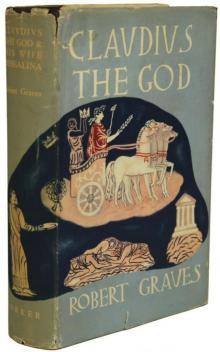 Claudius the God and His Wife Messalina
Claudius the God and His Wife Messalina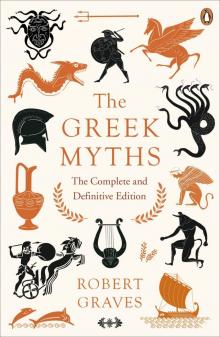 The Greek Myths
The Greek Myths I, Claudius
I, Claudius The Islands of Unwisdom
The Islands of Unwisdom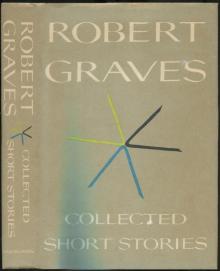 Complete Short Stories
Complete Short Stories The Golden Fleece
The Golden Fleece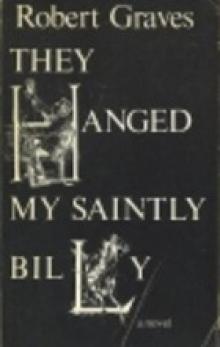 They Hanged My Saintly Billy
They Hanged My Saintly Billy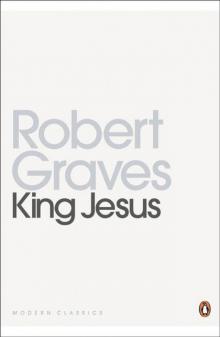 King Jesus
King Jesus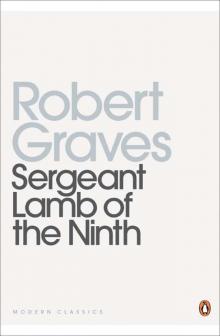 Sergeant Lamb's America
Sergeant Lamb's America Hebrew Myths: The Book of Genesis
Hebrew Myths: The Book of Genesis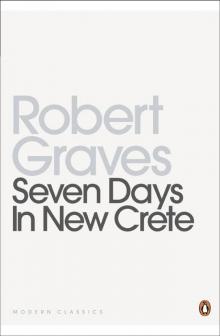 Seven Days in New Crete
Seven Days in New Crete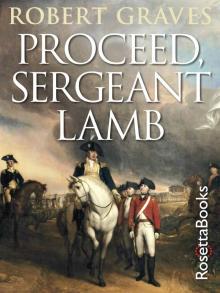 Proceed, Sergeant Lamb
Proceed, Sergeant Lamb Claudius the God
Claudius the God Wife to Mr. Milton
Wife to Mr. Milton The Complete Poems
The Complete Poems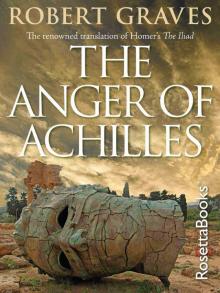 The Anger of Achilles
The Anger of Achilles Claudius the God c-2
Claudius the God c-2 Hebrew Myths
Hebrew Myths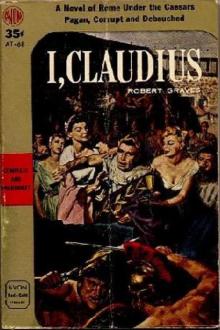 I, Claudius c-1
I, Claudius c-1 The Greek Myths, Volume 1
The Greek Myths, Volume 1